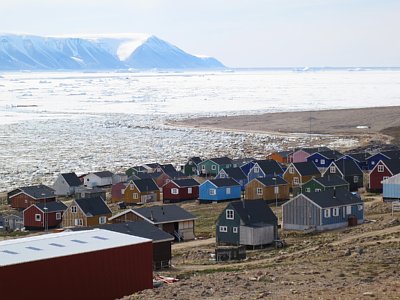



The greenland ice sheet and glaciers are discharging ice and meltwater into the ocean.




The greenland ice sheet and glaciers are discharging ice and meltwater into the ocean.
The Greenland ice sheet and peripheral glaciers are rapidly losing
mass under the influence of pronounced warming in the Arctic
region. Such changes were firstly observed in the south, and recently
spreading into northwestern Greenland. Recession of ice and increase
in meltwater discharge are affecting the regional and global
environments. Further, chaning coastal environments affects human
activities in the region.
Qaanaaq –study site–
Our research project investigates glacier and ice sheet changes with
special emphasis on ice-ocean interactions. Warming ocean is suspected
as the trigger of rapid retreat of calving glaciers. In turn, ocean
environments and marine ecosystems are influenced by increasing amount
of meltwater discharge. Understanding such interactions of ice
sheet/glacier and the ocean is crucial to predict future changes in
the coastal environment in Greenland and their influence on the
society.
To this end, we perform field and satellite observations, sampling and
analyses of snow/ice and sea water, and numerical modeling of glaciers
and the ocean. Our focus is the region nearby Qaanaaq, one of the
northern most villages in northwestern Greenland. Qaanaaq is inhabited
by 600 people and they are living on a Greenlandic traditional way of
life, such as hunting animals and fishing using dog sledges on sea
ice. These activities are now affected by drastically changing natural
environments. For example, use of a dog sledge is limited in a shorter
season because of declining sea ice. Changes are expected in marine
resources under the influence of warming ocean. The goal of our
project is to provide the indigenous people in Qaanaaq useful
information for their activity. Accurate data on changing glaciers and
the ocean should help them to adjust their life to the changing
environment.
This project is running under the framework of Arctic Challenge for
Sustainability Project (ArCS). ArCS is a Japanese initiative to
investigate rapidly changing Arctic and its influence to global
environment. Our study is a contribution to one of the ArCS project "Variations in the ice sheet,
glaciers, ocean and environment in the Greenland region" and supported
by ILTS as one of the Research Program of Joint Research
Division.
Field campaign 2015
Field campaign 2016
Field campaign 2017
Field campaign 2018
Field campaign 2019
Field campaign 2022
Field campaign 2023
Project members
Publications
Previous project